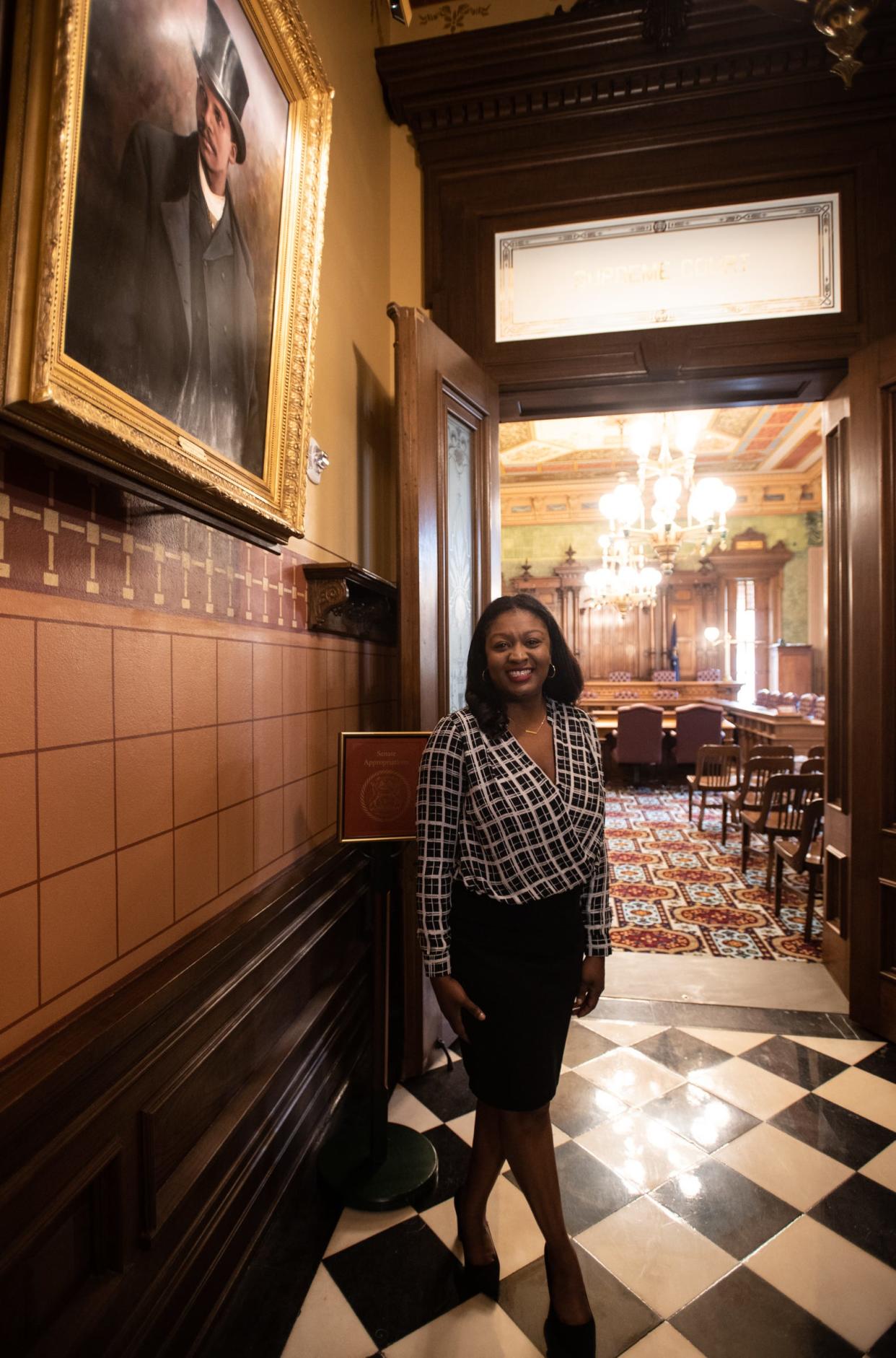Lansing Sen. Sarah Anthony celebrates Senate passage banning hair discrimination

- Oops!Something went wrong.Please try again later.
LANSING — After four years of languishing in the Michigan Legislature, Sen. Sarah Anthony’s legislation to ban discrimination over a person's hair has passed the Senate with significant bipartisan support.
The Creating a Respectful and Open World for Natural hair Act, or CROWN Act, adds protection for hairstyles associated with people of color under Michigan’s Elliott-Larsen Civil Rights Act. The expansion of the ELCRA changes the definition of race to include “hair texture” and “braids, locks and twists.”
“It's taken us a long time to get to this point, but I think it's been worth the wait,” Anthony, D-Lansing, said. “I've just heard too many stories of men and women and children who have been denied opportunity because of their hair.”
The bill passed the Senate with all 20 Democrats and 13 of 18 Republicans supporting it. This week, it received endorsement from all four Republican representatives who were present at a House Criminal Justice Committee hearing and was advanced in a 12-0 vote.
If the bill is passed by the full House, Gov. Gretchen Whitmer is expected to sign it, and that signature would put Michigan in step with more than 20 other states that have instituted similar protections.
“I don't know why our Republican leadership in the past four years did not have the willingness — or some would even say the courage — to at least give the bill a hearing,” Anthony said.
A 2020 study by assistant professor Christy Zhou Koval at Michigan State University found that 80% of Black women felt they needed to present a non-natural hairstyle to fit in at their workplace. A similar Duke University study found that Black women were seen as less professional and less likely to receive job interviews if they had an afro or braids.
Adjoa Asamoah, co-creator of the national CROWN Coalition, testified in a Michigan House hearing Tuesday in support of the bill. She said Black people often experience implicit or explicit pressure to keep a “professional” hairstyle that conforms with majority-white workplaces or institutions.
“These purportedly race-neutral grooming and dress code policies in the workplace that reinforce a Eurocentric image of professional hair are problematic,” Asamoah said.
She also pointed to how students are discriminated against in school settings as a reason for approving the bill.
“The psychological impact of being told the way you were born — the way you look — is not OK is something no person should have to endure, especially our babies," she said.

JeDonna Dinges and her daughter, India, said they have experienced the discrimination the bill is intended to prevent.
“I've had jobs where where comments have been made to me by white peers about my hair,” JeDonna Dinges said. “It is something that is real for people, and it's very hurtful and it's wrong. We can't allow it to continue to happen.”
Dinges and Anthony both cited a 2021 incident in Mt. Pleasant in which a biracial 7-year-old girl had her hair cut by employees without her parents' permission. Her father filed a $1 million lawsuit against the school district, which was later settled.
“These things are unacceptable,” Dinges said. “I felt like it was an assault.”
India Dinges said she also faced hair discrimination in her high school classes.
“I've had to hear from other classmates that my hair was too big or that my hair was blocking the whiteboard in class," she said. “It was very hurtful and it made me feel like I had to straighten my hair just to be able to go to school and function.”
Anthony and Asamoah pointed to the negative health impacts some studies have associated with chemical hair straighteners people of color often use in an attempt to fit in.
“This isn't just a financial issue or a cultural issue — it also impacts the health and safety of of women,” Anthony said. “By not forcing women to straighten their hair with chemicals and other mean and allowing them to show up as their selves or with other protective styles, we're also helping women's healthcare.”
After using chemical hair straighteners into her early 20s, Anthony was told by her doctor that she was starting to develop fibroids. She was advised to stop using the products due to the health risks.
Anthony has been fighting to the CROWN Act since first introducing it in the House in 2019. She introduced it again in 2021, but the Republican-controlled chamber sent the bill to the “legislative graveyard,” she said.
Anthony said she was “pleasantly surprised” by the level of bipartisan support in the Senate when she introduced the bill this term, and hoped to see similar support in the House.
She said the bill fits in with a set of other social protections that Democrats have prioritized since retaking control of Lansing this year.
“When we look at our labor market, when we look at our talent shortages, we need to be attracting all sorts of people and hair shouldn't be a barrier,” she said. “The CROWN Act feels like another example of a way that we can ensure that we are honestly lowering barriers for everyone.”
Anthony said despite pushback from some opponents, she will continue to support the effort.
“I have been told I should focus on something more important to you ‘real Michiganders,’ that these issues are silly,” she said. “But I promised that I would bring my whole experience to this job and a part of that experience is me being a Black woman — and I know that there's Black women and Black girls who have experienced this form of discrimination.
Numerous groups have supported the bill. The Lansing Regional Chamber of Commerce came out in support of the bill this week, according to Senior Vice President of Public Affairs Steve Japinga.
"Passing the CROWN Act would represent a significant step in the right direction," he said in a statement. "By embracing this legislation, we would send a powerful message that Michigan is committed to fostering an environment where diversity, inclusion, and equal opportunity thrive. It is through such actions that we can attract and retain talented individuals from all walks of life, ultimately strengthening our businesses, communities, and economy as a whole."
Contact Sheldon Krause at skrause@lsj.com. Follow him on Twitter @sheldonjkrause.
This article originally appeared on Lansing State Journal: Sarah Anthony celebrates Senate passage banning hair discrimination

